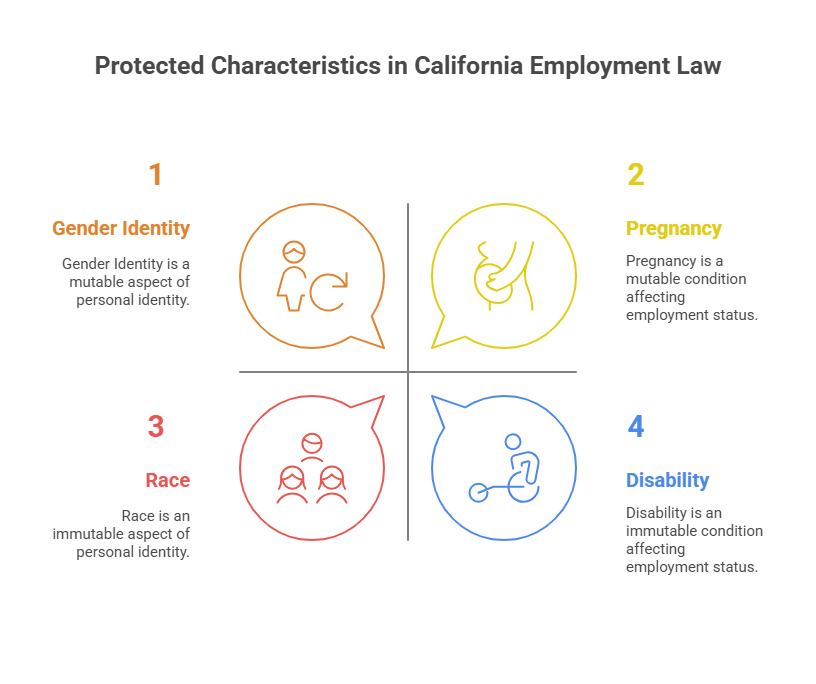How to Sue a Company For Discrimination in California

To sue a company for discrimination in California, these are the key steps to take:
- Collect documentation
- Report internally
- Choose the right agency
- Participate in mediation or investigation
- Receive a Right-to-Sue letter
- File your lawsuit with help from our employment attorney
Experiencing workplace discrimination can be emotionally devastating and financially damaging. The psychological toll of being treated unfairly based on who you are can affect every aspect of your life.
Without taking action, discriminatory behavior often escalates, potentially leading to wrongful termination, lost wages, and severe damage to your career trajectory. Your workplace rights matter, and California law provides strong protections.
Our discrimination lawyers in California have successfully represented numerous clients facing similar situations. In one case, we secured a $1.4 million settlement for a client in a wrongful termination employment case in Los Angeles.
Our Huntington Beach workplace discrimination lawyer team is ready to provide a free consultation to help you understand your legal options and fight for the justice you deserve.
Can you sue for discrimination?
Yes, you can sue your employer for discrimination if you’ve experienced unfair treatment based on a legally protected characteristic. Both federal law and California law allow employees to file lawsuits against employers for illegal discrimination.
California offers some of the strongest workplace protections in the nation. These laws apply to most employers, regardless of size, though some federal protections only apply to companies with 15 employees or more.
💡 Many people think they need direct proof, like a slur or statement. In reality, changes in treatment, hours, pay, or job role can all support a discrimination case.
If a hostile work environment, harassment, or discriminatory practices have affected your employment, you may have grounds for legal action. The law protects against both overt and subtle forms of bias.
You don’t have to fight this battle alone. Our experienced employment attorney will help you manage the complex legal process and level the playing field against your employer.

How to file a discrimination complaint against a business in California
We advise that you follow these six core steps to file a discrimination complaint against a business in California:
1. Collect documentation
Document every incident of discrimination with dates, times, locations, and names of witnesses. Save relevant emails, text messages, performance reviews, and other communications.
Keep detailed notes about discriminatory comments, actions, or patterns of behavior. If possible, document how others in similar positions but without your protected characteristic were treated differently.
Strong documentation forms the foundation of your case. The California Fair Employment and Housing Act (FEHA) provides broader protections than federal law, but evidence is still essential.
Our attorneys will guide you through exactly what documentation to gather and how to organize it effectively. We will help you identify patterns of discrimination that might not be immediately obvious and ensure you’re collecting the most compelling evidence for your case.
2. Report internally
If you feel safe doing so, report the discrimination to your company’s human resources department or follow your employer’s complaint procedure. This allows your employer to address the issue.
Keep copies of your internal complaint and any responses you receive. If your employer fails to take appropriate action or retaliates against you, this strengthens your case.
Sometimes you may face pushback or dismissal of your concerns. Document these responses carefully, as they may demonstrate your employer’s failure to address discrimination.
Our employment attorneys will advise you on the best way to phrase your internal complaint to protect your legal rights. We will review your draft communications before you send them and help you manage difficult conversations with HR or management.
3. Choose the right agency
You must file a charge of discrimination with either the Equal Employment Opportunity Commission (EEOC) or the California Civil Rights Department (CRD, formerly DFEH) before filing a lawsuit.
The CRD enforces the Fair Employment and Housing Act and provides protections that often exceed federal standards. Many employees choose to file with the CRD because California employment laws are generally more favorable than federal laws.
When you file with one agency, you can request “dual filing,” which means your complaint is shared with the other agency as well. You can file with the CRD online through their complaint portal, by mail, or in person at a CRD office. Similarly, you can file with the EEOC through their online system or at your nearest EEOC office.
Our attorneys will help determine whether filing with the EEOC or CRD would be more advantageous for your specific situation. We will prepare your complaint to ensure it properly addresses all potential legal claims and handle the entire filing process on your behalf.
4. Participate in mediation or investigation
After you file your charge, the agency may offer mediation or conduct an investigation into your claims. During this process, both you and your employer will have opportunities to present evidence.
The agency might interview witnesses, review documents, and evaluate whether there is reasonable cause to believe discrimination occurred. This investigation can take several months to complete.
If mediation is offered, consider it seriously. It can provide a faster resolution than waiting for an investigation to conclude and may result in a satisfactory settlement.
Having our legal team represent you during agency mediation or investigation significantly strengthens your position. We will prepare you for interviews, respond to agency requests, and ensure your rights are protected throughout the process.
5. Receive a Right-to-Sue letter
Regardless of the investigation’s outcome, you have the right to request a “Right-to-Sue” letter. This document permits you to file a private lawsuit in court. You may request this letter at any time, but if you do so before the investigation is complete, the agency will typically stop investigating.
Once you receive your right-to-sue notice, the clock starts ticking on your deadline to file a lawsuit. With a federal right-to-sue letter from the EEOC, you have only 90 days to file your lawsuit. With a state right-to-sue letter from the CRD, you have one year.
Our attorneys will strategically time your request for a Right-to-Sue letter based on the progress of your investigation and other factors that might impact your case. We’ll ensure you understand the implications of receiving this letter and the deadlines it triggers.
6. File your lawsuit with help from our employment attorney
Once you have your right-to-sue letter, you can file a discrimination lawsuit in court. At this stage, having our experienced employment law attorney is essential to manage the litigation process effectively.
Our lawyer will draft and file your complaint, handle discovery (the exchange of evidence), represent you in depositions and court hearings, and potentially negotiate a settlement on your behalf.
The lawsuit process can be lengthy and complex, but with proper legal representation, you can pursue the compensation and justice you deserve for the discrimination you experienced.
With our track record of successful discrimination cases, including our $1.4 million wrongful termination settlement, we have the experience to build a compelling case. Our attorneys will handle all aspects of litigation from drafting your complaint to representing you in court, allowing you to focus on your well-being during this challenging time.
Our Torrance workplace discrimination lawyer team has extensive experience helping employees hold employers accountable for discriminatory practices.
What is the time limit for filing a charge of discrimination?
For federal claims with the EEOC, you generally must file within 180 days of the discriminatory act. However, in California, this deadline extends to 300 days because of our state’s anti-discrimination laws.
For state claims with the CRD, California law provides a longer timeframe of 3 years from the date of the discriminatory act to file your charge.
| Agency | Discrimination Type | File Deadline | Lawsuit Deadline After Right-to-Sue |
|---|---|---|---|
| EEOC | Federal claims | 180/300 days | 90 days |
| CRD | California claims | 3 years | 1 year |
| Special cases | Government employer | As little as 6 months | Varies by entity |
⚠️ These deadlines are strict. If you miss them, you may lose your right to pursue legal action regardless of how strong your case is.
The time frame may differ if your employer is a government agency, a union shop, or has fewer than five employees. Consulting with our attorney early ensures you don’t miss critical deadlines.
Additional reading: California discrimination laws

What happens after you file a charge of discrimination?
After you file with the EEOC or CRD, the agency will notify your employer about the charge and begin its process. Initially, the agency may offer mediation to both parties. This voluntary process brings you and your employer together with a neutral mediator to try to resolve the dispute without an investigation or lawsuit.
If mediation isn’t successful or isn’t chosen, the agency will investigate your claims. This may involve interviewing witnesses, reviewing documents, and gathering other evidence from both sides. Many people think the agency will punish their employer. But the EEOC and CRD don’t typically “punish”—they investigate and give you the right to take action through a private lawsuit.
After completing its investigation, the agency will issue a determination. If they find reasonable cause to believe discrimination occurred, they might attempt to resolve the case through conciliation. If the agency finds no reasonable cause or is unable to determine whether discrimination occurred, you still have the right to sue. The agency will issue a right-to-sue letter, allowing you to file a lawsuit in court.
This is when legal representation becomes critical. Our attorney will evaluate the agency’s findings, advise you on the strength of your case, and guide you through the litigation process.
Our discrimination lawyers in California are standing by to answer your questions and help you take the first step toward justice. Contact us today for a free, confidential consultation.
What types of discrimination are illegal in California?
California’s Fair Employment and Housing Act provides broader protections than federal law. Here are the protected characteristics under California employment law:
- Race and color
- National origin and ancestry
- Gender identity and sex
- Sexual orientation
- Pregnancy, childbirth, or related medical conditions
- Disability (mental or physical)
- Age (40+)
- Religion and religious practices
- Marital or familial status
- Military or veteran status
- Medical condition
- Genetic information
- Political affiliation (for government employees)
The California Family Rights Act also protects employees who take leave for family or medical reasons from discriminatory treatment.
💡 California laws are often broader than federal ones. Even perceived bias or implicit discrimination may qualify under the right circumstances, and California’s protections extend to smaller businesses than federal law covers.

Proving workplace discrimination
Building a strong discrimination case requires careful documentation and strategic action. Here’s how to prove discrimination on the job:
- Save written performance reviews, emails, texts, and other communications that show your job performance and any changes in treatment.
- Write a timeline of what happened, including specific incidents, comments, and how the discrimination affected your job duties, pay, or advancement opportunities.
- Talk to coworkers who witnessed the discrimination and may be willing to provide statements or testimony.
- Report the discrimination internally through proper channels and document any retaliation that follows.
- Contact our lawyer before quitting or taking drastic steps that could potentially harm your case.
You do not need to file with the CRD or EEOC if you intend to pursue claims under the Equal Pay Act, which addresses gender-based pay discrimination.
Hypothetical Scenario: A 55-year-old software developer notices that after a new, younger manager joins the company, she’s gradually removed from important projects. Despite her excellent performance reviews, she’s given administrative tasks while younger colleagues receive promotions. When she asks questions about the changes, she’s told the company “needs fresh perspectives.” This pattern of age-related comments and diminished responsibilities could form the basis of an age discrimination claim.
Hypothetical Scenario: An employee with a disability requests a reasonable accommodation of a flexible start time to accommodate medical treatments. His supervisor initially agrees but then begins giving him negative performance reviews citing “punctuality issues,” despite his completion of all work on time. After he files a complaint with HR, he finds himself excluded from meetings and gradually isolated from his team. This pattern of behavior following his accommodation request and complaint could constitute both disability discrimination and retaliation.
Get help from our California discrimination attorneys
Facing discrimination at work can feel isolating and overwhelming. Our employment attorneys understand the complex emotions and challenges you’re experiencing. We offer a free consultation to discuss your situation and help you understand your options. There’s no obligation, and all conversations are completely confidential.
Acting quickly is essential. Delays can cost you your legal right to sue and obtain the compensation you deserve.
⚠️ If you’ve experienced discrimination, harassment, or a hostile work environment, don’t wait until the situation deteriorates further or until you’re terminated.
Our team has helped workers from diverse backgrounds stand up against discriminatory practices by employers of all sizes. We understand how to manage both federal and state systems to protect your rights.
Wondering what your claim might be worth? Try our discrimination lawsuit settlement calculator for an estimate of potential compensation based on your specific situation. Then reach out to our team for more tailored guidance.
Disclaimer: The results provided by this discrimination lawsuit settlement calculator are for informational purposes only and do not constitute legal advice. The estimates are based on general inputs and do not reflect the unique details of your case, such as jurisdictional laws or liability factors.
Ready to take action against workplace discrimination? Contact us online or call (866) 646-6676 for a free, confidential consultation with our California employment attorneys.

FAQs
What if I'm still employed—can I still take legal action?
Yes, you can take legal action while still employed. Many discrimination cases are filed by current employees. California law specifically prohibits retaliation against workers who file discrimination complaints or participate in investigations.
Can I file a discrimination complaint anonymously?
While you cannot file an anonymous charge with the EEOC or CRD, these agencies are required to keep your information confidential during their investigation. However, your employer will be informed of your identity as part of the process.
Will suing my employer hurt my future job prospects?
This is a common concern, but remember that it’s illegal for employers to discriminate against job applicants because they’ve previously filed discrimination claims. Many cases settle confidentially, and professional reference checks typically only confirm employment dates and titles.
What if the discrimination happened months ago?
You may still be able to file if you’re within the time limits. In California, you have 3 years to file with the CRD. Additionally, if the discrimination was ongoing or part of a continuing pattern, the deadline might be calculated from the most recent incident.
Can I take legal action if HR didn't respond to my complaint?
Yes. Your employer’s failure to address your internal complaint appropriately can actually strengthen your case. It demonstrates that you attempted to resolve the issue through proper channels before seeking external remedies.
Related Posts

Four Injured in Downtown Los Angeles Crash

Pedestrians Injured in LA Sidewalk Crash

Injury Reported in Los Angeles Highway 60 Crash

Pedestrian Injured in South Hoover Street Accident

Driver Flees After East Hollywood Crash




